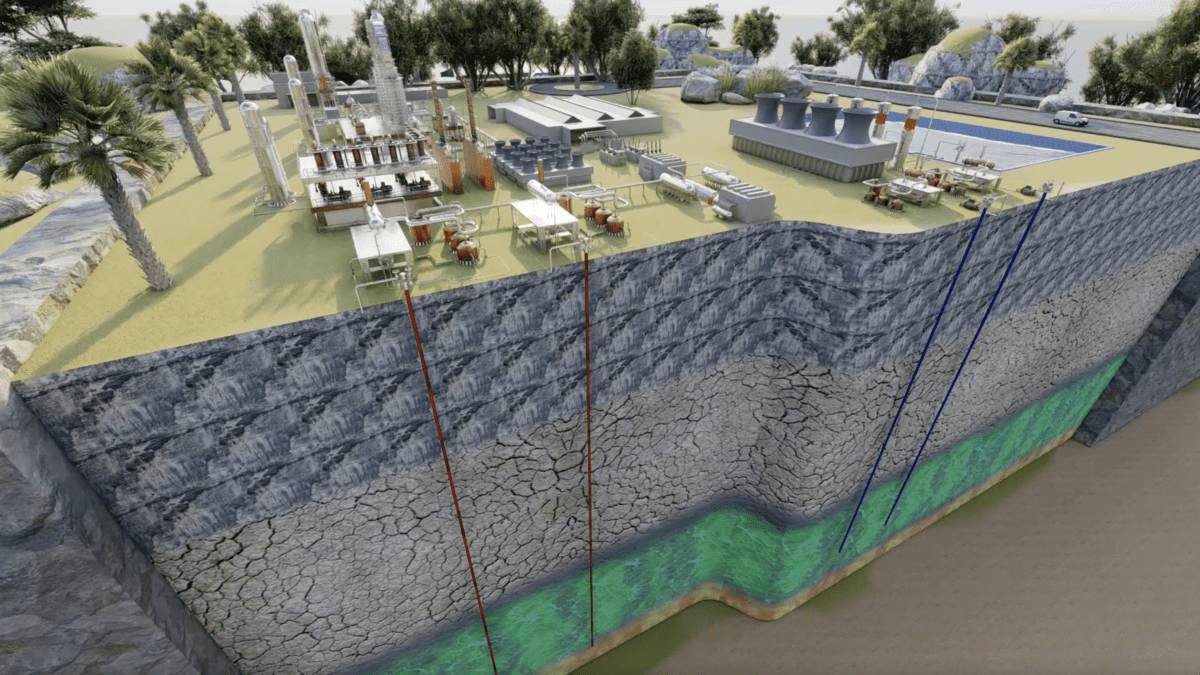Geoscience technology company founded by MIT/WHOI Joint Program student awarded $3.8M from U.S. Department of Energy
 Enhanced Geothermal Systems consist of injection wells, production wells, and reservoir stimulation activities to increase permeability and maximize heat recovery for renewable power generation. Photo by Eden GeoPower Inc.
Enhanced Geothermal Systems consist of injection wells, production wells, and reservoir stimulation activities to increase permeability and maximize heat recovery for renewable power generation. Photo by Eden GeoPower Inc. June 2, 2022
Woods Hole, MA — Eden, a geoscience technology development company co-founded by Massachusetts Institute of Technology/Woods Hole Oceanographic Institution Joint Program student Paris Smalls, will receive $3.8 million in federal funding from the U.S. Department of Energy Advanced Research Projects Agency-Energy (ARPA-E). These funds are part of the ARPA-E OPEN 2021 program, which prioritizes technologies that support novel approaches to clean energy challenges.
Smalls is the lead principal investigator for the project titled “Electro-Hydraulic Fracturing of Enhanced Geothermal Systems”. He will lead a team of researchers at Eden, MIT, and Idaho National Laboratory to develop novel technology that aims to maximize heat recovery from geothermal systems, while saving billions of gallons of water compared to traditional hydraulic fracturing methods.
“We started Eden with a mission to make scalable, sustainable extraction of Earth’s geothermal heat and natural resources possible,” said Smalls. “Once we fully commercialize the technology, we will look at other market applications. This will include increasing permeability to maximize injectivity of CO2 during carbon sequestration, and creating permeable subsurface flow pathways for sustainable recovery of critical minerals like nickel, cobalt, and copper.”
The collaborative project is furthering first-of-its-kind electrical reservoir stimulation technology that has applications in the geothermal, mining, and petroleum industries. Eden’s founders describe it as a safer, more effective, and more efficient method of recovering Earth’s natural resources—helping us achieve a carbon-free future. This is especially important for decarbonizing the mining industry and increasing power output from geothermal wells.
Current hydraulic fracturing techniques, which had tremendous success in the oil and gas industry, need more attention regarding stimulation of geothermal reservoirs due to the extreme pressure and temperature conditions. Eden is taking a radically different approach to reservoir stimulation, which utilizes high-voltage electricity as the main mechanism to increase reservoir permeability. This technology complements recent innovations in geothermal reservoir drilling, since drilled wells will need to be successfully activated to achieve maximum net power output per well.
“The support that I’ve received from the MIT/WHOI Joint Program over the years has been incredible,” Smalls said. “I greatly appreciate the program administrators and my advisors for recognizing early on both the environmental and societal impact of our ambitions. Eden is dedicated to fighting climate change and making a difference, especially to underprivileged and marginalized communities affected by it most. We also hope that our success will encourage more diverse students and entrepreneurs to pursue careers in deep technology development.”
###
About Woods Hole Oceanographic Institution
The Woods Hole Oceanographic Institution (WHOI) is a private, non-profit organization on Cape Cod, Massachusetts, dedicated to marine research, engineering, and higher education. Established in 1930, its primary mission is to understand the ocean and its interaction with the Earth as a whole, and to communicate an understanding of the ocean’s role in the changing global environment. WHOI’s pioneering discoveries stem from an ideal combination of science and engineering—one that has made it one of the most trusted and technically advanced leaders in basic and applied ocean research and exploration anywhere. WHOI is known for its multidisciplinary approach, superior ship operations, and unparalleled deep-sea robotics capabilities. We play a leading role in ocean observation and operate the most extensive suite of data-gathering platforms in the world. Top scientists, engineers, and students collaborate on more than 800 concurrent projects worldwide—both above and below the waves—pushing the boundaries of knowledge and possibility. For more information, please visit www.whoi.edu
